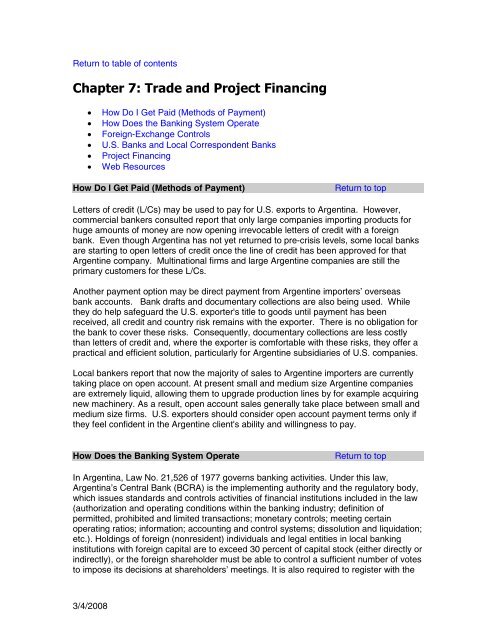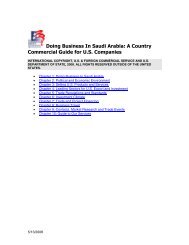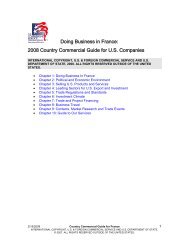You also want an ePaper? Increase the reach of your titles
YUMPU automatically turns print PDFs into web optimized ePapers that Google loves.
Return to table of contents<br />
Chapter 7: Trade and Project Financing<br />
3/4/2008<br />
How Do I Get Paid (Methods of Payment)<br />
How Does the Banking System Operate<br />
Foreign-Exchange Controls<br />
U.S. Banks and Local Correspondent Banks<br />
Project Financing<br />
Web Resources<br />
How Do I Get Paid (Methods of Payment) Return to top<br />
Letters of credit (L/Cs) may be used to pay for U.S. exports to <strong>Argentina</strong>. However,<br />
commercial bankers consulted report that only large companies importing products for<br />
huge amounts of money are now opening irrevocable letters of credit with a foreign<br />
bank. Even though <strong>Argentina</strong> has not yet returned to pre-crisis levels, some local banks<br />
are starting to open letters of credit once the line of credit has been approved for that<br />
Argentine company. Multinational firms and large Argentine companies are still the<br />
primary customers for these L/Cs.<br />
Another payment option may be direct payment from Argentine importers’ overseas<br />
bank accounts. Bank drafts and documentary collections are also being used. While<br />
they do help safeguard the U.S. exporter's title to goods until payment has been<br />
received, all credit and country risk remains with the exporter. There is no obligation for<br />
the bank to cover these risks. Consequently, documentary collections are less costly<br />
than letters of credit and, where the exporter is comfortable with these risks, they offer a<br />
practical and efficient solution, particularly for Argentine subsidiaries of U.S. companies.<br />
Local bankers report that now the majority of sales to Argentine importers are currently<br />
taking place on open account. At present small and medium size Argentine companies<br />
are extremely liquid, allowing them to upgrade production lines by for example acquiring<br />
new machinery. As a result, open account sales generally take place between small and<br />
medium size firms. U.S. exporters should consider open account payment terms only if<br />
they feel confident in the Argentine client's ability and willingness to pay.<br />
How Does the Banking System Operate Return to top<br />
<strong>In</strong> <strong>Argentina</strong>, Law No. 21,526 of 1977 governs banking activities. Under this law,<br />
<strong>Argentina</strong>’s Central Bank (BCRA) is the implementing authority and the regulatory body,<br />
which issues standards and controls activities of financial institutions included in the law<br />
(authorization and operating conditions within the banking industry; definition of<br />
permitted, prohibited and limited transactions; monetary controls; meeting certain<br />
operating ratios; information; accounting and control systems; dissolution and liquidation;<br />
etc.). Holdings of foreign (nonresident) individuals and legal entities in local banking<br />
institutions with foreign capital are to exceed 30 percent of capital stock (either directly or<br />
indirectly), or the foreign shareholder must be able to control a sufficient number of votes<br />
to impose its decisions at shareholders’ meetings. It is also required to register with the












